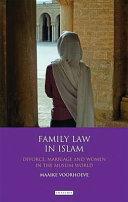
Family Law in Islam
Divorce, Marriage and Women in the Muslim World
"The Eastern Question, as it was termed by the European Powers in the nineteenth century, was a debate primarily concerned with the issue of 'what to do with the Turk?'. The Ottoman Empire had become known as the 'sick man of Europe' following its gradual decline since the eighteenth century, and its demise would be highly problematic for the crowned heads of Europe. This unique book focuses on the intellectual and political dynamics of the first Ottoman political opposition in the modern sense, the so-called 'Young Ottomans'. In the process it narrates an alternative version of the Eastern Question as experienced and told by its Eastern observers and critics. Nazan A icek shows how an important section of the newly-rising semi-autonomous Ottoman Muslim Turkish intelligentsia in the second half of the nineteenth century, effectively answered the alternative question of 'what to do with the West?'."--Bloomsbury publishing.
- ISBN 13 : 9780755692842
- ISBN 10 : 0755692845
- Judul : Family Law in Islam
- Sub Judul : Divorce, Marriage and Women in the Muslim World
- Pengarang : Maaike Voorhoeve,
- Kategori : Divorce
- Bahasa : en
- Tahun : 2012
- Google Book : http://books.google.co.id/books?id=_ZufzwEACAAJ&dq=intitle:FAMILY+ISLAMIC+LAW&hl=&source=gbs_api
-
Ketersediaan :
This unique book focuses on the intellectual and political dynamics of the first Ottoman political opposition in the modern sense, the so-called 'Young Ottomans'.








